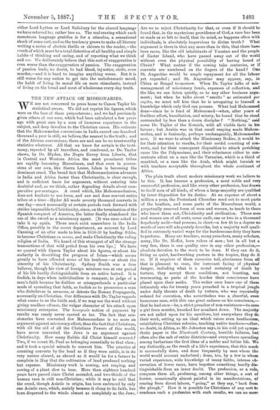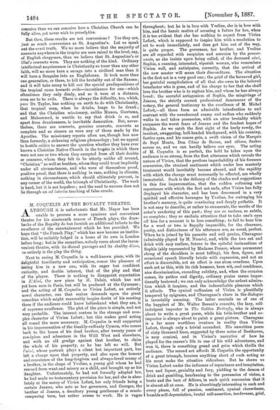THE NEW ATTACK ON MISSIONARIES.
WE are not concerned to press home to Canon Taylor his statistical errors. We did not reprint his figures, which were on the face of them preposterous ; and we had previously given others of our own, which had been calculated a few years ago with great care by a man of immense experience in the subject, and deep devotion to the Christian cause. His estimate that the Mahommedan conversions in India exceed one hundred thousand a year is still, we believe, the nearest to the truth ; and of the African conversions, there are and can be no trustworthy statistics whatever. All that we know for certain is the testi- mony, repeated by all travellers, and confirmed, as Dr. Taylor shows, by Dr. Blyden, the Negro Envoy from Liberia, that in Central and Western Africa the most prominent tribes are rapidly becoming Mossulman, and that even in posses- sions of our own, like Sierra Leone, Islam is becoming the dominant creed. The broad fact that Mahommedanism advances in India and Africa faster than Christianity, is clear enough, and is sufficient basis for argument, without entering into doubtful and, as we think, rather degrading details about com- parative per-centages. A creed which, like Mahommedanism, does not hesitate to use force, and can and does convert entire tribes at a time—Ryder Ali made seventy thousand converts in one day—must necessarily at certain periods rush forward with strides impossible to Christianity, since, on the termination of the Spanish conquest of America, the latter finally abandoned the use of the sword as a missionary agent. [It was once asked to take it up again. There must exist somewhere in the India Office, possibly in the secret department, an account by Lord Canning of an offer made to him in 1858-59 by leading Sikhs, to become Christians en masse, and make Christianity the ruling religion of India. We heard of this strangest of all the strange transactions of that wild period from his own lips.] We have no quarrel with Canon Taylor about his figures, or about his audacity in describing the progress of Islam—which seems greatly to have offended some of his brethren—or about the sincerity of his Christianity. Sydney Smith was a firm believer, though his view of foreign missions was at one period of his life hardly distinguishable from an active hatred. It is foolish, in days when individualism is rampant, to judge of a man's faith because he dislikes or misapprehends a particular mode of spreading that faith, as foolish as to pronounce a man who disbelieves in sermons, or detests the Roman Propaganda, necessarily nn-Christian. Our difference with Dr. Taylor regards what seems to no the futile and, if we may use the word without giving needless offence, the vulgar character of his attack upon missionary enterprise. The bourgeois notion of payment by results was surely never carried so far. The fact that mis- sionaries have converted few Mahommedans ie no more an argument against missionary effort, than the fact that Christians, with all the aid of all the Christians Powers of this world, have never converted the Jews is an argument against Christianity. How many Rabbis did Christ himself convert ? Two, if we count St. Paul as belonging essentially to that class ; and it took a special miracle to convert him. The practice of counting converts by the head as if they were cattle, is in its very nature absurd, as absurd ae it would be for a farmer to complain in May that the cultivation of land produced nothing but expense. Missionary work is sowing, not reaping, and sowing of a plant slow to bear. More than eighteen hundred years have passed since Christ ascended, and two-thirds of the human race is still non-Christian ; while it may be said that the creed, though Asiatic in origin, has been embraced by only one Asiatic race, which, mainly because it clung to its faith, has been dispersed to the winds almost as completely as the Jews.
Are we to reject Christianity for that, or even if it should be found that, in the mysterious providence of God, a race has been so made or so left to itself, that its mind, as happens often with individuals, is absolutely impervious to divine truth ? What argument is there in that any more than in this, that there have been races, like the old inhabitants of Yucatan and the people of Easter Island, who have passed away out of the world without even the physical possibility of having heard of Christ? What matter if the sowing take centuries, or if converts are numbered on the fingers of the hand P One St. Augustine would be ample repayment for all the labour yet expended ; and St. Augustine may appear, say, in China or Bengal tomorrow. When Dr. Taylor talks of mis- management of missionary funds, expenses of collection, and the like, we can listen quietly, as to any other business argu- ment; but when he talks about " results " as estimated per capita, we must tell him that he is arrogating to himself a knowledge which only God can possess. What had Mahommed done—since he is fond of Mahommed—when, after years of fruitless effort, humiliation, and misery, he found that he stood surrounded by less than a dozen disciples P "Nothing," said some Dr. Taylor of the Koreish, with all visible facts in his favour ; but Arabia was in that small reaping made Mahom- medan, and is furiously, perhaps unchangeably, Mahommedan now. If we were to attack the Missionary Bodies, it would be for their attention to results, for their sordid counting of con- verts, and for their consequent disposition to attack perishing races like the Polynesians, and their reluctance either to con- centrate effort on a race like the Turanian, which is a third of mankind, or a race like the Arab, which might furnish us with teachers acceptable throughout the whole continent of Africa.
The plain truth about modern missionary work we believe to be this. It has become a profession, a most noble and very successful profession, and like every other profession, has drawn to itself men of all kinds, of whom a large majority are qualified by inner disposition for its duties. At an expense of about a million a year, the Protestant Churches send oat to most parts of the heathen, and some parts of the Mussulrnan world, a perpetually renewed force of men and women, to teach to those who know them not, Christianity and civilisation. Those men and women are of all sorts, some unfit, one or two in a thousand hopelessly unlit—bad persons, in short—a few fit to a degree no words of ours will adequately describe, but a majority well quali- fied in extremely varied ways for the burdensome duty they have to perform. Many are teachers, many preachers, many scholars, many, like Dr. Moffat, born rulers of men ; but in all but a very few, there is one quality rare in any other profession,— absolute devotion to the work to be done. If they can do it, living as quiet, hardworking pastors in the tropics, they do it so. If it requires of them excessive toil, abstinence from an that is pleasant to man, the incessant facing of physical danger, including what is a moral certainty of death by torture, they accept those conditions, not boasting, not murmuring, as parte of the burden their consciences have placed upon their necks. The writer once knew one of them intimately who for twenty years preached in a tropical jungle under daily threats of death by torture, who was repeatedly ordered for execution, who nevertheless was a cheerful, even humorous man, with this one great sadness on his conscience,— that he had once—he, a strict preacher of non-resistance—to save a girl from murder, knocked her assailant down. The majority are not called upon for his sacrifices, but everywhere they*. their work, setting up an ideal which raises even heathenism, establishing Christian colonies, teaching native teachers—often, no doubt, in Africa, as Mr. Johnston says, in his cold yet sympa- thetic paper in the Nineteenth Century, horrible failures, but often also the salt of entire districts—and everywhere spreading
among barbarians the first ideas of a nobler and loftier life. We say distinctly, as the result of a life's experience, that this much is successfully done, and done frequently by men whom the world would account underbred ; done, too, by a few in whom varied experience, wide knowledge of many faiths, intense ob- servation of lower races, have begotten something hardly die- tingaishable from an inner doubt. The profession, as a rale, conquers them all, producing, among other things, a sort of horror, occasionally almost painful in its manifestations, of ceasing from direct labour, " going," as they say, " back from the plough." How it is possible for Christians of any sort to condemn such a profession with such results, we can no more conceive than we can conceive how a Christian Church can be fully alive, yet never wish to proselytise.
But then, these results are not conversions ? Yes they are, just as much conversions as St. Augustine's. Let us speak oat the exact truth. We no more believe that the majority of converts anywhere in the tropics are men raised to the level, say, of English clergymen, than we believe that St. Anguatine's or Olaf's converts were. They are nothing of the kind. Ordinary intellectual acquiescence in Christianity as truer than any other faith, will no more turn a savage into a civilised man than it will tarn a Bengalee into an Englishman. It took more than one generation, or three, to kill the brutality out of the Saxons ; and it will take many to kill out the special predispositions of the tropical races towards evils—incontinence for one—which oftentimes they only dimly, and as it were at a distance, even see to be evils. There is always the difficulty, too, which, pace Dr. Taylor, has nothing on earth to do with Christianity, that tropical man, when he drinks, longs to be drunk ; and that the Christian missionary, unlike Mnnoo, Gautama, and Mahommed, is unable to say that drink in se, and apart from drunkenness, is inevitable damnation. But, never. theless, there are converts, genuine converts, converts as complete and as sincere as were any of those made by the Apostles. The missionary reports often use, though less now than formerly, a sickening religions phraseology; but we appeal to hostile critics to answer the question whether they have ever known a Christian Native Church in the tropics in which there were not one or two whom they excepted from all their doubts or censures, whom they felt to be utterly unlike all around, "Christian" as well as heathen, whom they could trust implicitly under all circumstances, and who were of themselves proof, positive proof, that there is nothing in race, nothing in climate, nothing in circumstance, which should ultimately prevent, in any corner of the world, the triumph of Christianity. The work is hard, but it is not hopeless ; and the road to success does not lie through an ad interim teaching of false creeds.



















































 Previous page
Previous page